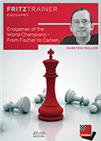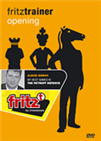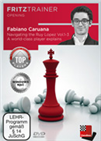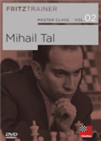Thrilling from start to finish
The format delivered what it had promised, as the two highest-rated players in the world scored back-to-back clutch wins to put an end to a highly exciting final match. Fabiano Caruana only needed a draw in the very last encounter, as he came from taking the lead for the first time in the match with a remarkable win in game 11. However, it was Magnus Carlsen who obtained the last three-pointer to take the title.
 World numbers one and two not only showed their magnificent chess skills, but also demonstrated maturity and sportsmanship during the post-match interviews. Who better than them to tell the story of what happened on day two of the final? Let us start with Carlsen:
World numbers one and two not only showed their magnificent chess skills, but also demonstrated maturity and sportsmanship during the post-match interviews. Who better than them to tell the story of what happened on day two of the final? Let us start with Carlsen:
In terms of basketball, I guess we were scoring on every possession, because we started with two draws and the next nine out of ten were decisive — there were no consecutive wins in the whole match, which is just pretty sick.
Indeed, only three out of twelve games finished drawn. Moreover, the player with the white pieces won the last four games of each day — blows were traded repeatedly! Carlsen scored when it mattered most though. As Caruana put it:
It was just like I wasn't there in the last game. [...] Unfortunately, you can't have any real weaknesses when you're playing against Magnus, and the last game was a very big weakness. [...] You have to keep fighting well until the end.
Commentator Maurice Ashley, who created the ‘clutch chess’ format, asked Carlsen if that is what makes a champion a champion — to win when the stakes are the highest. The world champion elaborated:
 Let endgame expert Dr Karsten Müller show and explain the finesses of the world champions. Although they had different styles each and every one of them played the endgame exceptionally well, so take the opportunity to enjoy and learn from some of the best endgames in the history of chess.
Let endgame expert Dr Karsten Müller show and explain the finesses of the world champions. Although they had different styles each and every one of them played the endgame exceptionally well, so take the opportunity to enjoy and learn from some of the best endgames in the history of chess.
I think champions should show both — they should show dominance over time and also dominance in the critical moment. Obviously, this particular format means that performing at the critical moment outshines everything else.
Unlike after Saturday's first half, Carlsen did not feel he had been the clearly superior player. First, he explained:
Today it really could have gone either way. I won the first game, which was okay, but the next four, to be honest, I think he played a lot better than I did. But fortunately I took the one chance that I had in the final game — it feels pretty sweet!
And later, he concluded:
Judging by the way we played today, he was as deserved a winner as I was. He deserves credit for a very good match.
It was a memorable final match, no doubt about it!
[Photo: Crystal Fuller]
Games 7-10: The pre-clutch clutch
Carlsen started the day with a convincing win. He got the better of his opponent in what would end up being the only win of the match for the player marshalling the black pieces. This victory came after Caruana had bounced back from his two losses at the end of day one. However, this time around he did not manage to hit back immediately, as a 63-move draw meant Carlsen was ahead on the scoreboard with four games left to play.
The comebacks continued though, as Caruana won game 9 in style. The American got a dominant position in the early middlegame, and cemented his advantage when Carlsen erred on move 23:
Black pushed the wrong pawn by playing 23...e4, allowing 24.b3, when White solidified his structure and left the black knight totally out of play. Instead, 23...f5 with the idea of 24.Qxf5 Qxf5 25.Nxf5 Nxc4 would have massively improved Black's position. From this point on, Carlsen defended resourcefully, but Caruana was up to the task, as he patiently converted his advantage into a win.
Game 10 was crucial, as if there was a winner he would go into the clutch games with draw odds — a ‘pre-clutch clutch game’ as Jennifer Shahade put it. And a strange opening sequence showed up on the board:
 Alexei Shirov continues the successful and highly praised series of his best games. Since many players look on the Russian Defence with the suspicion that it is a drawish opening, and one which at the same time is both dry and boring, Shirov has in this DVD set himself the specific task of countering this view of matters.
Alexei Shirov continues the successful and highly praised series of his best games. Since many players look on the Russian Defence with the suspicion that it is a drawish opening, and one which at the same time is both dry and boring, Shirov has in this DVD set himself the specific task of countering this view of matters.
This position was reached for the last time in game 6 of the 2018 World Championship match. Back then, Caruana had responded with the sound 9...Nd4, mirroring White's threat against the c7-pawn. On Sunday, however, he went for the mysterious 9...c6, leaving the commentators dumbfounded — was that preparation or a blunder? Apparently, Carlen feared it was preparation and responded with 10.Bxe2 instead of opting for the critical 10.Nc7+.
That was not the only strange decision seen in that game though. Carlsen lost his edge in the middlegame in uncharacteristic fashion, and Caruana just as strangely completely misplayed the ensuing endgame. Carlsen got the full point and only needed a win — or two draws — to secure match victory.
Games 11-12: Double clutch
When Carlsen said that Caruana had “played a lot better than [he] did”, he probably based his opinion mostly on his rival's performance in game 11. Caruana was a pawn up and had a strong position throughout, but he also needed to find precise moves to convert, most notably:
 The Ruy Lopez is one of the oldest openings which continues to enjoy high popularity from club level to the absolute world top. In this video series, American super GM Fabiano Caruana, talking to IM Oliver Reeh, presents a complete repertoire for White.
The Ruy Lopez is one of the oldest openings which continues to enjoy high popularity from club level to the absolute world top. In this video series, American super GM Fabiano Caruana, talking to IM Oliver Reeh, presents a complete repertoire for White.
The commentators had seen 35.Nb8 in a previous position, but also noted that it is a very difficult manoeuvre to find in a blitz game. Caruana, who consistently handled the clock better than Carlsen during the match, had enough time to find it though. There followed 35...Qd8 36.Nxa6 Bxd5 37.Nc7 Bb7 38.Nxe8 Re7 39.Qxb7 Rxb7 40.Ned6 Nf8 and Black resigned. [You can play through this sequence and try your own variations on the diagram above!].
Caruana only needed a draw with black, and later confessed that he felt he would not lose the last game, but that did not prevent him from quickly losing the thread in the deciding encounter. Carlsen was ruthless:
White immediately broke in the centre to make use of his many positional trumps: 16.e6. Black could have played the ugly 16...f6 to continue fighting, but went for 16...fxe6 instead. 17.Ng5 was the key idea, and Black is in deep trouble. The game continued 17...Rf6 18.Qc2 Rg6:
 On this DVD Dorian Rogozenco, Mihail Marin, Oliver Reeh and Karsten Müller present the 8. World Chess Champion in video lessons: his openings, his understanding of chess strategy, his artful endgame play, and finally his immortal combinations.
On this DVD Dorian Rogozenco, Mihail Marin, Oliver Reeh and Karsten Müller present the 8. World Chess Champion in video lessons: his openings, his understanding of chess strategy, his artful endgame play, and finally his immortal combinations.
19.Rxe6 was the lethal blow! Caruana gave up his queen and tried to hold on to dear life, but Carlsen did not put a foot wrong and got the all-important win after 31 moves.
| |
Total |
G1 |
G2 |
G3 |
G4 |
G5* |
G6* |
G7 |
G8 |
G9 |
G10 |
G11** |
G12** |
| Magnus Carlsen |
9½ |
½ |
½ |
1 |
0 |
1 |
0 |
1 |
½ |
0 |
1 |
0 |
1 |
| Fabiano Caruana |
8½ |
½ |
½ |
0 |
1 |
0 |
1 |
0 |
½ |
1 |
0 |
1 |
0 |
*Games 5 and 6 are worth two points each
** Games 11 and 12 are worth three points each
Select an entry from the list to switch between games
Links


















 World numbers one and two not only showed their magnificent chess skills, but also demonstrated maturity and sportsmanship during the post-match interviews. Who better than them to tell the story of what happened on day two of the final? Let us start with Carlsen:
World numbers one and two not only showed their magnificent chess skills, but also demonstrated maturity and sportsmanship during the post-match interviews. Who better than them to tell the story of what happened on day two of the final? Let us start with Carlsen:




